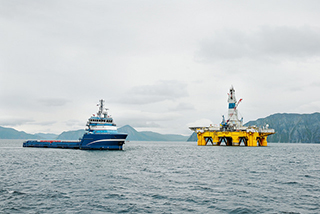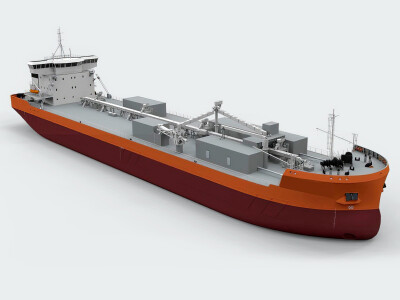Two weeks after granting Royal Dutch Shell permission to begin drilling for oil in the Chukchi Sea, President Obama was in Alaska to talk about his strategy on climate change – and pushing back on environmental activists who bitterly oppose his decision on the Shell venture.
“Our economy still has to rely on oil and gas,” Obama said in his last weekly address of August. “As long as that’s the case, I believe we should rely more on domestic production than on foreign imports.”
As Obama visited a shrinking glacier and coastal villages besieged by shoreline erosion, Shell’s team was dealing with high seas and gale-force winds that forced suspension of operations on the Polar Pioneer semisubmersible rig leased from Transocean Ltd. High water was a problem on Alaska’s north shore too, as Shell temporarily relocated some workers from housing in Barrow because of road flooding.
Political winds blew around the Obama administration, under fire for permitting Shell’s venture in the daunting and remote waters where a spill would be a nightmare to clean up. Obama insisted the exploration is being done “at the highest standards possible, with requirements specifically tailored to the risks of drilling off Alaska.”
The drillship Polar Pioneer and offshore supply vessel Harvey Supporter in Dutch Harbor, Alaska, July 2015. Photo: ShellIt’s another chapter in Obama’s can’t-win relationship with many factions in the debate over energy policy -- including people in the Gulf of Mexico offshore industry who could never forgive the Obama moratorium on drilling after the 2010 Deepwater Horizon blowout disaster.
There are signals that Washington may not be ready to grant more Arctic drilling leases beyond Shell’s attempt, which actually dates back to the last Bush administration. In a briefing to reporters in Washington, Obama energy advisor Brian Deese pushed back on suggestions that the administration is “opening up the Arctic” to exploration. At the Department of Interior, little preparation has been made for new lease offerings scheduled for 2016.
For all the Washington chatter about Obama’s “climate legacy,” there’s another industry that’s really feeling it. In the October issue of WorkBoat, correspondent Dale DuPont will report on the fast fall of coal – and its impact on barge operators, who transport one-fifth of the nation’s supply.
Between the administration’s energy and environment plans, and stiff competition from natural gas, it’s expected about one-third of coal-fired power plant capacity will be retired by 2020. The average price of Illinois Basin coal is down 35% from summer 2012, and tonnage on the inland waterways is dropping too.





